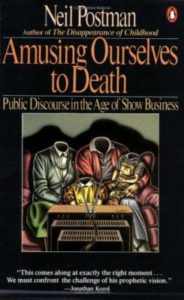
Around the same time, Aldous Huxley, an English writer and philosopher proposed a similar gloomy future in his novel Brave New World . Only this time its citizens are engineered through artificial wombs and put in predetermined classes based on intelligence and strength. To keep society in order and prevent them from knowing the truth, the people who live in it are sustained by a constant diet of soothing, happiness-inducing drug.
Postman, a generation ago poignantly predicted things would get worse in a Huxleyan sense rather than the popular Orwellian one. That society’s ruin would not come resulting from malevolent cultural forces, but by our loves and desires.1
Vincent Miller in Consuming Religion expands on this. He argues that the daily activities we engage in are a result of unwittingly adopting a habit of consuming goods without thinking of the harmful costs it takes to produce them. We are socialized into thinking and behaving in ways that betray our values in part because we have embraced the status quo. For example, we are unconscious in the way we check off our grocery list of produce, canned goods and sundries but fail to realize the human cost it took (growing, harvesting, delivery, etc.) to end up in our shopping basket.
Betraying ones values is typically not something we do consciously. Even inmates are not excused for they adhere to a prison ethic. The popular academic view states that our behaviors are dictated by our beliefs. We act according to what we have been taught is right. The more we are educated and learn proper doctrine, principles and formulas, the more we become civilized—so the theory goes. This has been the educational telos from the start. The problem with this method is that it overemphasized the life of the mind with the exclusion of practice.
There are more ways of knowing than simply reading it from a book. James K.A. Smith lectures on this topic often. In his book Imagining the Kingdom, he talks about a process of “deformation” and looking at the “Christian perception of the world” by borrowing concepts from Merleau-Ponty such as “practognosia,” a know-how that is absorbed through our bodies.2 This absorption in our bodies of truth and practices is precisely what happens when we are shaped by the consumption culture.
As Christians, we must conform our lives in consonant with Jesus teachings and resist, by God’s grace and power, anything that gets in the way of our sanctification. But what process of conforming do we engage in? If it is an item of knowledge, a simple correction will do. But we are dealing with a whole set of beliefs and practices enmeshed in a society. Cultural pundits constantly tell us the West is in decline and the church echo in unison. The church seems to think revival will come about from more preaching and teaching. If this is true, why are things appearing to be worse (Deborah Tannen’s Argument Culture, incivility, gender confusion, etc.) than a generation ago while churches in the U.S. stalwartly remained active in preaching, teaching and missions? While we cannot presume what God will do, he also has given us wisdom to be enact things in this world.
Miller is right when he identifies the problem and a way forward:
“If the abstraction and fragmentation of religious traditions are the result of cultural habits learned in other practices of consumption, then challenging the abstracting effects of commodification on the general level will be helpful for countering it on the explicitly religious level.”3
This is a great start. However, I regret that I do not have the space to continue with practical tips on combating the culture of consumption. Theologian, pastors and evangelists have a tough time recognizing the relevance and ill effects of a consumption culture as it relates to spiritual matters. This is one reason, as leaders helping a generation come of age, our efforts must be calculated and aimed at the real issue. Suffice it to say, “the most fundamental tactic for countering the commodification of culture is simple awareness of it as a problem.”4
- Neil Postman, Amusing Ourselves to Death: Public Discourse in the Age of Show Business (New York, NY: Penguin Books, 1988), viii.
- Apologeticscom, Sanctified Perception: How Worship Works, YouTube, April 30, 2014, , accessed February 21, 2019, https://www.youtube.com/watch?v=BrU3yhGogqY.
- Vincent Jude Miller, Consuming Religion: Christian Faith and Practice in a Consumer Culture (New York: Bloomsbury, 2013), 10.
- Ibid., 192.






